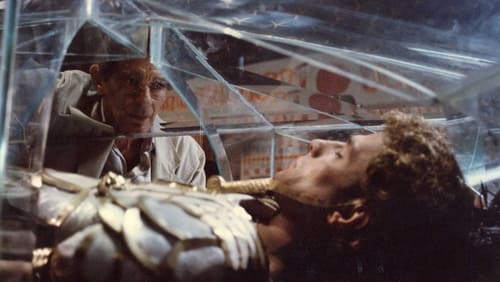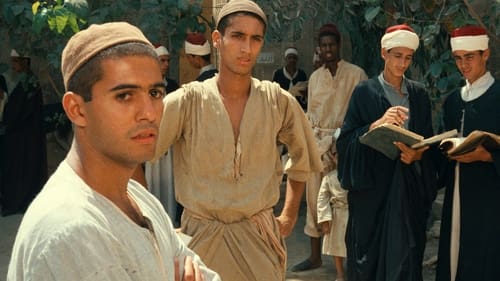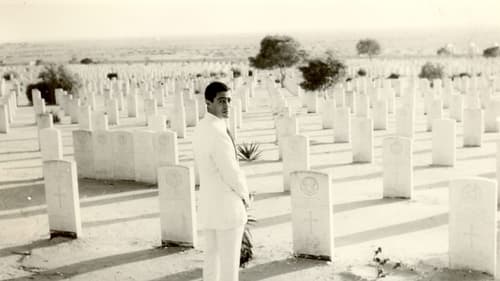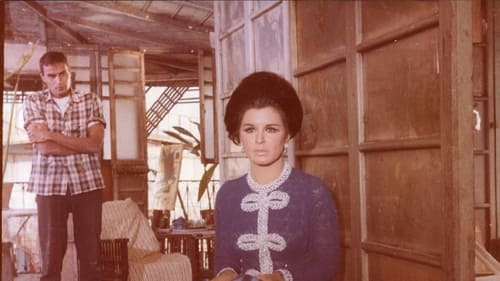Saif Abdel Rahman
Nacimiento : 1942-05-27, Egypt
Historia
Seif Abdel Rahman is an Egyptian actor who was born in 1942. He graduated from History Department in the Faculty of Arts. In the beginning of his career, he acted with the National Troupe for Popular Arts. At the end of the 1960s, Youssef Chahine discovered him and cast him in the film “Fagr Yeom Gadid” (Dawn Of a New Day). Afterwards, he appeared in a number of other films, including “El Ikhteeyar” (The Choice), “El Asfour” (The Birds), “Eskanderiya Leh?” (Alexandria...Why?), “Hadouta Masriyya” (Egyptian Story), “El Maseer” (Destiny), “Saraqat Sayfeeya” (Summer Thefts), “Marcides,” “Concerto Fi Darb Sa’ada” (Concert in Darb Sa’da).

A retired Egyptian officer working at the Egyptian embassy in Tel Aviv decides to plot revenge against Israel for freezing his bank accounts when he objected to its monstrous conduct in Palestine. In Egypt, he recruits five of his former students to rob Israel’s largest bank.

Hatem is a corrupt police officer, who loves his neighbor Nour, who in turn loves the prosecutor, Sherif and Hatem tries to win Nour’s attention even if by force.

Playboy Amr (Ahmed Eid) studies at the Faculty of Medicine, he lives a careless life between the use of drugs and neglect of study, and then falls in love with fellow religious veiled Farah (Bushra), and tries to woo her by pretending to be religious and then she discovers the truth.

Ramzy
When Surgeon Hamza commits a mistake that leads to the death of a child, he's sentenced to jail and prevented from practicing his profession. The widow Rawia enters his isolated life after meeting her in an auction and then he meets three young teenagers who find refuge in him.

فوده
During the Gulf War, Fatma works as a maid for a wealthy man, and her son Mohammed is suffering from oppression by his teacher Mansour, who's having an affair with Fatima, taking advantage of her difficult circumstances. Mohammad gets drawn to extremist religious world led by Sheikh Khalid.

Ali, an aspiring actor, works in a government-aided butchery, and takes a part in a cheap play, while his father wants him to start working in fruit trade. Ali pursues his long-lived dream of traveling abroad and flies to France with an acting troupe, where he starts living illegally alongside many other Arabs, and starts a life-changing experience that he won't remember fully until he returns to Egypt.

Salem
This film is an exploration of what happens to places in general, and people in particular, once the menfolk abandon an Egyptian village to investigate the greener-grass on the proverbial 'other side'. The womenfolk, those too old and those too young are left behind... and as the years pass, only letters return, telling tales of loneliness and hard-times. A young man, Ahmed, grows-up under these surroundings and has to deal with being the de-facto man-in-charge; when several of the migrant workers return one day, everyone has to come to terms with things being forever changed.

Directed by Asmaa El-Bakry.

Caliph's brother
La historia está ambientada en al-Andalus en el siglo XII, donde el famoso filósofo Averroes es nombrado juez por el gran califa. Rivales políticos del califa, centrados en el líder de una secta islámica fanática, obligan al califa a enviar a Averroes al exilio, pero sus ideas siguen viviendo gracias a sus alumnos.

While the great businessman Noman El-Prince is at sea on a yacht outing, he hits a fisherman's boat and kills both the fisherman and his son. Prosecutor Hamdi handles the investigation, and some fishermen testify against Noman, who is imprisoned pending the case. But his lawyer succeeds in proving his innocence by fabricating defense witnesses. He incites one of his aides to kill Hamdi.

The biblical tale of Joseph is told from an Egyptian perspective in this interesting character study. In this film, Joseph is called Ram. Ram, tired of his family's backward superstitious life, and tired of being picked on by his brothers, wants to go to Egypt to study agriculture. His brothers travel with him across Sinai, but then suddenly sell him to Ozir, an Egyptian who works for a Theban military leader, Amihar. Amihar is impressed by Ram's drive and personal charm and so grants Ram some desolate land outside the capital. Ram soon finds himself a pawn in the political and sexual games between Amihar and his wife Simihit, a high priestess of the Cult of Amun.

Mohamed Taher
Nubi spent a period of his life in a mental hospital after his father deposited him unjustly. He is not crazy, but his father donated all he had to the Communist Party, which was adhering to its principles. The government then placed the family property under guard. Nubian lives with his mother Rose and discover amazing facts, including that his father, who bears his name is not his real father, but his mother gave birth to her brown friend, and then discovered that his brother missed the family and no one knows his place but joined the extremist group.

Salah
(Ghraib) recounts the entire march of his life, which intersects with the fortunes of the city of Suez over two centuries through the tripartite aggression and the defeat of 1967, where he remembers the circumstances in which his parents met and the death of his father when he was a member of the popular resistance at the time of the triple aggression To study and work at the printing press with Al-Asi (Salah), the owner of the house where Gharib lives with his mother, and a stranger to Mahmoud, whose father is in the Popular Resistance.

Public Relations
Set in 1987 against the backdrop of a hunger strike by the Egyptian film industry, Chahine himself steps in to play Yehia, the famed Egyptian director whose life is chronicled in "Alexandria, Why?" and "An Egyptian Story". Obsessed with Amr, the handsome actor he discovered and cast as his alter-ego in parts one and two of The Alexandria Trilogy, Yehia pressures Amr to star in various film projects that change even as Yehia's perception of the young actor begins to change. He first casts Amr as Hamlet, which the actor deems too demanding for his talents, then as the lead in a musical biopic of demigod Alexander the Great, who founded the city of Alexandria in 332 B.C.

Mohamed Bey
Set in 1987 against the backdrop of a hunger strike by the Egyptian film industry, Chahine himself steps in to play Yehia, the famed Egyptian director whose life is chronicled in "Alexandria, Why?" and "An Egyptian Story". Obsessed with Amr, the handsome actor he discovered and cast as his alter-ego in parts one and two of The Alexandria Trilogy, Yehia pressures Amr to star in various film projects that change even as Yehia's perception of the young actor begins to change. He first casts Amr as Hamlet, which the actor deems too demanding for his talents, then as the lead in a musical biopic of demigod Alexander the Great, who founded the city of Alexandria in 332 B.C.

Aziz
Set in the summer of 1961 during Nasser's land reforms, ‘’Summer Thefts’’ is the story of a childhood friendship between Yasser, the son of a bourgeois landowner, and Leil, the son of an Egyptian peasant.

El Cairo 1947: la epidemia de cólera en pleno apogeo. La hermosa Lavandiere Saddika vive con su esposo paralizado y su pequeño hijo Hassan en un sótano. Sueña con el príncipe azul y frecuenta asiduamente los cines.

En el año 1798 el ejército francés liderado por Napoleón invadió Egipto, derrotando a todos los caciques mamelucos (que eran lo que quedaban del dominio otomano) y luego marchó sobre El Cairo. Tres hermanos viven cada uno a su manera este acontecimiento. Bakr, el mayor, planea la revuelta armada. Ali, el más intelectual de los hermanos, es partidario de un rechazo pacífico, mientras que Yehia, el menor, es tan inmaduro como impresionable y no se cierra al esplendor europeo.

Executive Producer
After we last see him in "Alexandria, Why?" Egyptian filmmaker Yehia Mourad is in his thirties, and successful in his work, he has grown distant from his wife and children and suffers a symbolic blockage of the heart while shooting the final scenes of his latest film. After being flown to England for evaluation, it's determined that Yehia must undergo emergency surgery. Fact and fiction blend seamlessly—with healthy doses of cleverly absurdist fantasy—as the film explores the various personalities and forces that have made Yehia (and Youssef Chahine) the man he has become.

After we last see him in "Alexandria, Why?" Egyptian filmmaker Yehia Mourad is in his thirties, and successful in his work, he has grown distant from his wife and children and suffers a symbolic blockage of the heart while shooting the final scenes of his latest film. After being flown to England for evaluation, it's determined that Yehia must undergo emergency surgery. Fact and fiction blend seamlessly—with healthy doses of cleverly absurdist fantasy—as the film explores the various personalities and forces that have made Yehia (and Youssef Chahine) the man he has become.

Amid the poverty, death, and suffering caused by World War II, 18-year-old Yehia, retreats into a private world of fantasy and longing. Obsessed with Hollywood, he dreams of one-day studying filmmaking in America, but after falling in love and discovering the lies of European occupation, Yehia profoundly reevaluates his identity and allegiances.

Producer
In this Andre Gide adaptation, an activist is released after many years in prison and returns home, shaking up established relationships among his family members at the farm governed by his strict father. Demonstrating Chahine’s eclecticism, this is an elegant melodrama, exuberant musical, layered allegory, and profound portrait of personal and political disillusionment.

Hassan
An Egyptian man falls in love with a Polish woman and gets a scholarship to be with her. Meanwhile, an American student decides to seduce him for revenge.

Sa'ad
The construction of the Aswan dam as seen by those who took part in it: engineers, workers, Egyptians, and Soviets.

Set shortly before and during the Six Day War in June of 1967, The Sparrow follows a young police officer stationed in a small village in Upper Egypt whose inhabitants suffer from the harassment of a corrupt businessman.

When a free-spirited sailor is found murdered, his twin brother--a famous novelist--is the prime suspect. Investigators uncover a possible liaison between the dead sailor and the writer's wife, and also learn that Sayed's successful fictions owed much to the inspiration of his brother Mahmoud's adventurous life. Just as the evidence against the novelist seems overwhelming, Mahmoud turns up alive. But why are the twins never seen together...?

esam

Renegotiating the representational paradigm of nationhood the film draws a heterogeneous picture of Egyptian society as well as Soviet workers as they embarked on the momentous dam enterprise. The films presents a vision of a nation deep rooted in unity as well as diversity. The films projection of a renewed imagining of the nation inadvertently acknowledges a new and nuanced understanding of its goals, political objectives, and how these impact the personal within it. (KHOURI)

khalil
Abbas, a resident of Cairo, is appointed by the government to hold the office of supervisor in a post office in a small village in Upper Egypt.

The story of a 40-year-old married woman who has fallen into idleness and does not know how to approach the revolutionary events in her country. She finds a new meaning in life when she falls in love with an aspiring young student. “I shot FAGR YOM GUEDID in 1964. I count it among my best films and still stand by it completely. It is about the class whose assets were nationalized after the 1952 revolution. I explored the question of whether this class still had a place in Egyptian society.”














